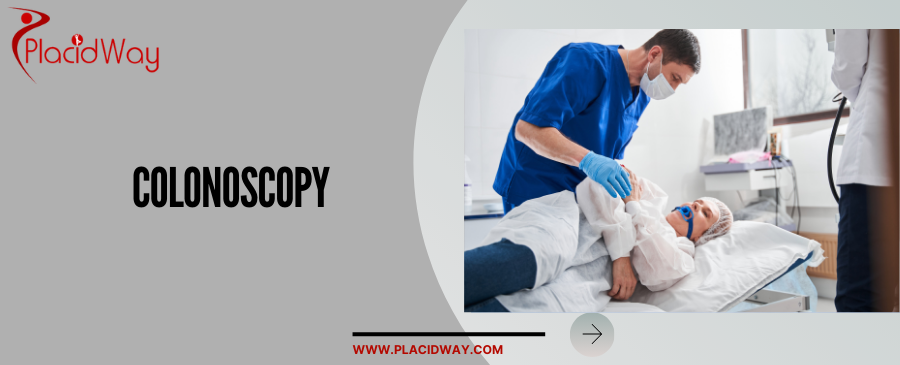
Your Guide to Colonoscopy: Early Detection & Affordable Options Abroad
Facing a medical procedure, especially one like a colonoscopy, can bring a mix of anxiety and questions. You might be wondering, "What exactly is it?" "Why do I need one?" or "Is there an affordable, high-quality option available?" At PlacidWay, we understand these concerns and are here to demystify the process, offering clear, compassionate answers and guiding you toward excellent healthcare solutions, even when considering treatment abroad.
A colonoscopy is more than just a medical test; it's a powerful tool in preventive healthcare, particularly for detecting and preventing colorectal cancer. Think of it as a thorough internal check-up for your large intestine, where a specialist uses a tiny camera to look for any red flags. This procedure can identify precancerous polyps, allowing for their removal before they ever have a chance to turn cancerous. It's often recommended for routine screening starting at age 45, or sooner if you have specific symptoms or a family history of colon cancer.
Many patients search for terms like "what is a colonoscopy procedure," "symptoms of colon cancer," "when should I get a colonoscopy," or "affordable colonoscopy options." This guide will address all these questions and more, helping you understand the procedure, its importance, and how medical tourism can provide access to world-class care at a fraction of the cost, without compromising on quality or safety. Let's explore how a colonoscopy can be a proactive step towards a healthier future for you.
What symptoms might suggest I need a colonoscopy?
While a colonoscopy is a standard screening tool for people over 45, certain symptoms might prompt your doctor to recommend one earlier. Paying attention to your body's signals is crucial for early detection. Many patients search for "what are the signs of colon cancer" or "blood in stool causes." Here are some key indicators that might necessitate a colonoscopy:
- Changes in Bowel Habits: This could include persistent diarrhea, constipation, or a change in the consistency of your stool that lasts for more than a few days.
- Rectal Bleeding or Blood in Your Stool: While this can be caused by benign conditions like hemorrhoids, it's a significant symptom that always warrants investigation. Blood can appear bright red or dark/tarry.
- Persistent Abdominal Discomfort: Cramps, gas, or pain in your abdomen that doesn't go away.
- A Feeling That Your Bowel Doesn't Empty Completely: Even after having a bowel movement.
- Unexplained Weight Loss: Losing weight without trying, especially when accompanied by other bowel symptoms.
- Fatigue or Weakness: Often due to iron-deficiency anemia caused by internal bleeding, even if not visible in stool.
If you experience any of these symptoms, especially if they are new, persistent, or concerning, it’s important to consult with a healthcare professional. They can evaluate your condition and determine if a colonoscopy is the appropriate next step for diagnosis.
What causes colon issues and who is at risk for colorectal cancer?
Understanding the underlying causes and risk factors is crucial for prevention and early intervention. Patients often ask, "what causes colon polyps" or "colon cancer risk factors." Several elements can contribute to the development of colon issues, including colorectal cancer:
Risk Factors You Can't Change:
- Age: The risk of colorectal cancer increases significantly after age 45.
- Family History: Having a close relative (parent, sibling, child) with colorectal cancer or advanced polyps significantly increases your risk. Genetic syndromes like Familial Adenomatous Polyposis (FAP) or Lynch Syndrome also increase risk dramatically.
- Personal History of Polyps or Colorectal Cancer: If you've had either, you're at higher risk for recurrence.
- Inflammatory Bowel Disease (IBD): Conditions like Crohn's disease or ulcerative colitis increase the risk of colon cancer.
- Racial and Ethnic Background: African Americans have higher rates of colorectal cancer.
Lifestyle-Related Risk Factors:
- Obesity: Being overweight or obese increases your risk.
- Physical Inactivity: Lack of regular exercise is a risk factor.
- Diet: A diet high in red and processed meats and low in fiber, fruits, and vegetables can increase risk.
- Smoking: Smokers are at an increased risk.
- Heavy Alcohol Use: Excessive alcohol consumption can also elevate risk.
- Type 2 Diabetes: People with type 2 diabetes have an increased risk.
While you can't change all risk factors, being aware of them empowers you to make informed lifestyle choices and adhere to recommended screening schedules to manage your risk effectively.
Who should get a colonoscopy and when is it recommended?
This is one of the most common questions patients have, often searching for "when to get a colonoscopy" or "colonoscopy screening age." The recommendations have evolved over time, emphasizing earlier screening due to rising rates of colorectal cancer in younger adults.
General Recommendations:
- Average Risk: If you have no personal or family history of colorectal cancer or polyps and no concerning symptoms, a colonoscopy is typically recommended starting at age 45. If the results are normal, repeat screenings are usually advised every 10 years.
Earlier or More Frequent Screenings Might Be Needed If You Have:
- A Family History: If a first-degree relative (parent, sibling, child) had colorectal cancer or advanced polyps before age 60, you might need to start screening 10 years before their diagnosis age, or no later than age 40.
- Personal History of Colorectal Polyps: Depending on the type, size, and number of polyps, you may need follow-up colonoscopies more frequently (e.g., every 3-5 years).
- Inflammatory Bowel Disease (IBD): Patients with Crohn's disease or ulcerative colitis often begin screening earlier and more frequently due to increased risk.
- Certain Genetic Syndromes: Conditions like Familial Adenomatous Polyposis (FAP) or Lynch Syndrome (hereditary nonpolyposis colorectal cancer) require very early and frequent screenings.
- Persistent Symptoms: As mentioned earlier, if you have ongoing symptoms like rectal bleeding, abdominal pain, or changes in bowel habits, your doctor may recommend a diagnostic colonoscopy regardless of age.
Always consult with your doctor to determine the most appropriate screening schedule based on your personal health history and risk factors. They can provide personalized recommendations for your situation.
What does a colonoscopy procedure involve and how should I prepare?
Many patients search for "what to expect during a colonoscopy" or "colonoscopy prep tips." The procedure itself is relatively straightforward, but the preparation is key to its success.
The Preparation:
This is often considered the most challenging part, but it's absolutely vital for a clear view of your colon. Think of it like cleaning a garden hose before you can inspect it for blockages. Poor prep can mean repeat procedures or missed abnormalities.
- Dietary Restrictions: Typically, you'll start a clear liquid diet 1-2 days before the procedure (no solid foods, red or purple liquids).
- Bowel Cleansing Solution: You'll drink a prescribed laxative solution, often in two stages, to empty your bowels completely. This will cause frequent, watery bowel movements.
- Hydration: It's crucial to stay hydrated with clear liquids during prep.
The Procedure:
- Sedation: Most colonoscopies are performed under conscious sedation or light general anesthesia, so you won't feel pain or remember the procedure.
- Insertion of Colonoscope: A long, flexible tube (colonoscope) with a light and camera is gently inserted through the rectum and advanced through the entire colon.
- Visualization and Polyp Removal: The doctor examines the lining of the colon for polyps, inflammation, or other abnormalities. If polyps are found, they are usually removed during the same procedure (polypectomy) and sent for biopsy.
- Air Insufflation: Air or carbon dioxide is often used to inflate the colon slightly for better visualization.
- Duration: The procedure itself typically takes 30-60 minutes.
After the procedure, you'll recover from sedation for a short period before being discharged, usually with a friend or family member, as you won't be able to drive.
What is the recovery like after a colonoscopy and what are the potential side effects?
Many patients wonder about "colonoscopy recovery time" and "is colonoscopy safe." Understanding what to expect post-procedure and the potential, albeit rare, risks can help alleviate concerns.
Immediate Recovery:
- Sedation Effects: You'll feel drowsy and disoriented from the sedation, which is why you need someone to drive you home. Avoid making important decisions or operating machinery for 24 hours.
- Gas and Bloating: It's common to experience some abdominal cramping, gas, or bloating as the air or CO2 introduced during the procedure passes out of your system. This usually resolves quickly.
- Diet: You can typically resume your normal diet immediately after the procedure unless your doctor advises otherwise.
- Activity: Rest for the remainder of the day. Most people feel well enough to return to normal activities the next day.
Potential Risks and Side Effects (Rare but Possible):
A colonoscopy is a very safe procedure, but like any medical intervention, it carries some minimal risks:
- Bleeding: Can occur at the site where a polyp was removed or a biopsy was taken. This is usually minor and stops on its own, but sometimes requires further intervention.
- Perforation: A tear or hole in the wall of the colon is a serious but very rare complication, often requiring surgery.
- Reaction to Sedation: Allergic reactions or breathing problems can occur, though medical staff monitor you closely to minimize these risks.
- Post-Polypectomy Syndrome: Rare inflammation of the colon wall after polyp removal, mimicking perforation but without a tear.
Your doctor will discuss these risks with you before the procedure. It's important to contact your doctor immediately if you experience severe abdominal pain, fever, significant rectal bleeding, or persistent vomiting after your colonoscopy.
How much does a colonoscopy cost worldwide?
One of the primary reasons patients explore options abroad is the stark difference in healthcare costs. Patients frequently search for "colonoscopy cost without insurance" or "affordable colonoscopy." Here's a general comparison to illustrate the potential savings:
| Country | Estimated Cost (USD) | Notes on Cost |
|---|---|---|
| United States | $2,500 - $5,000+ | Highly variable by state, facility, and if polyps are removed. Often includes separate fees for facility, physician, and anesthesiologist. |
| United Kingdom (Private) | $1,900 - $3,800 | Private healthcare costs; public healthcare (NHS) is free at point of use but may have waiting lists. |
| Mexico | $800 - $1,500 | Popular destination for US patients due to proximity and competitive pricing. |
| India | $500 - $1,000 | Known for advanced medical facilities and highly skilled doctors at very low costs. |
| Turkey | $700 - $1,200 | Growing medical tourism hub with modern hospitals and experienced specialists. |
| Thailand | $700 - $1,300 | Offers high-quality care in luxurious settings, attractive for a "medical holiday." |
*These are approximate costs and can vary based on the clinic, doctor's fees, type of sedation, whether biopsies or polyp removals are performed, and package inclusions. Always request a detailed quote.
Why consider getting a colonoscopy abroad for screening or diagnosis?
The decision to travel for medical care, often searched as "medical tourism for colonoscopy" or "overseas colonoscopy," is driven by several compelling factors:
- Significant Cost Savings: As seen in the table above, the cost of a colonoscopy in many popular medical tourism destinations can be 50-80% lower than in Western countries like the U.S. or U.K., even when factoring in travel expenses. This is especially beneficial for uninsured or underinsured patients.
- Access to Timely Care: In some countries, public healthcare systems may have long waiting lists for non-emergency procedures. Traveling abroad can provide immediate access to necessary screening or diagnostic colonoscopies, preventing delays that could impact health outcomes.
- High Quality and Advanced Technology: Many international hospitals catering to medical tourists boast state-of-the-art equipment, modern facilities, and highly trained, often Western-educated, medical professionals. These clinics frequently hold international accreditations (e.g., JCI), ensuring adherence to global standards.
- Privacy and Discretion: Some individuals prefer to undergo medical procedures away from their home country for reasons of privacy.
- Opportunity for a "Medical Vacation": Combining a necessary medical procedure with a trip to a new country can make the experience less stressful and more enjoyable, allowing for recovery in a relaxing environment.
For many, the benefits of affordability and efficiency, coupled with quality care, make medical tourism an attractive and viable option for vital procedures like a colonoscopy.
Which countries offer high-quality, affordable colonoscopies for international patients?
When searching for "best countries for colonoscopy abroad" or "safe medical tourism destinations," patients seek a balance of quality, safety, and cost. Here are some of the top choices:
- Mexico:
- Why: Proximity to the U.S. makes it ideal for many North Americans. High-quality private hospitals, often JCI-accredited, with English-speaking staff.
- Cities: Tijuana, Monterrey, Guadalajara, Mexico City.
- India:
- Why: World-renowned for highly skilled doctors and state-of-the-art medical infrastructure at incredibly competitive prices. Many doctors are Western-trained.
- Cities: Delhi, Mumbai, Chennai, Bangalore.
- Turkey:
- Why: A rapidly growing medical tourism hub, offering modern hospitals equipped with advanced technology and highly experienced specialists, particularly in Istanbul and Ankara.
- Cities: Istanbul, Ankara, Izmir.
- Thailand:
- Why: Known for its luxurious private hospitals, excellent patient care, and English-speaking staff, often combined with a popular tourist destination experience.
- Cities: Bangkok, Phuket, Chiang Mai.
- South Korea:
- Why: Leads in medical technology and research, offering highly efficient and advanced medical services. Known for precision and high standards of care.
- Cities: Seoul.
- Costa Rica:
- Why: A popular choice for North Americans, offering reputable facilities and experienced doctors in a beautiful, natural setting.
- Cities: San José.
These countries have established medical tourism industries that prioritize international patient care, making them excellent choices for a colonoscopy.
What should I expect when traveling for a colonoscopy and how do I prepare?
Preparing for a colonoscopy abroad requires a bit more planning than one at home, but with the right support, it can be seamless. Patients often look for "colonoscopy travel guide" or "planning medical travel."
Before You Travel:
- Medical Records: Gather all relevant medical history, previous test results, and a referral from your local doctor, if applicable.
- Consultation: Have an initial consultation (often virtual) with the gastroenterologist abroad to discuss your case, clarify expectations, and ensure you're a suitable candidate.
- Travel Logistics: Work with a facilitator like PlacidWay to arrange flights, accommodation (consider proximity to the clinic), and local transportation. Many clinics offer airport pickup and local transport.
- Colonoscopy Prep Instructions: Ensure you receive and understand the specific dietary and bowel cleansing instructions from the international clinic. These might vary slightly from what you're used to. It's often best to start a strict liquid diet for the final day or two *while already at your destination*.
- Companion: Arrange for a travel companion, especially if you're undergoing sedation. You'll need someone to assist you post-procedure.
- Insurance: Check if your travel insurance covers medical emergencies abroad. Standard health insurance typically doesn't cover elective procedures abroad, but some offer specific medical tourism add-ons.
During Your Trip:
- Arrival: Allow yourself a day or two to settle in before the procedure.
- Pre-Procedure Appointment: You'll have an in-person consultation with the doctor, blood tests, and other checks.
- Procedure Day: Follow all prep instructions meticulously. The procedure will be similar to what you'd expect at home.
- Recovery: Plan for at least one full day of rest after the procedure. Ensure you have comfortable accommodation for recovery.
- Follow-up: Discuss how to receive your results and any follow-up care instructions with the clinic before you leave.
With careful planning and support from a reliable facilitator, your medical travel for a colonoscopy can be stress-free and successful.
How can I ensure safety and quality when getting a colonoscopy overseas?
Ensuring safety and quality is paramount when considering medical treatment abroad. Patients often search for "accredited hospitals overseas" or "finding reputable clinics abroad." Here's how to minimize risks and maximize a positive outcome:
- Choose Internationally Accredited Facilities: Look for hospitals and clinics that have international accreditations, such as those from the Joint Commission International (JCI). This signifies adherence to global standards of patient safety and quality of care.
- Verify Physician Credentials: Research the gastroenterologist's qualifications, experience, and board certifications. Many international doctors have received training in Western countries.
- Read Patient Testimonials and Reviews: Online reviews and success stories can offer insights into other patients' experiences with the clinic and its staff.
- Utilize a Reputable Medical Tourism Facilitator: Companies like PlacidWay specialize in connecting patients with vetted, high-quality international providers. They can help with vetting clinics, coordinating logistics, and providing support.
- Clear Communication: Ensure the medical team speaks your language or that reliable translation services are readily available. Miscommunication can lead to errors.
- Understand the Full Cost: Get a detailed, itemized quote that includes all potential costs (procedure, anesthesia, polyp removal, biopsies, follow-up, facility fees) to avoid hidden charges.
- Pre- and Post-Procedure Plan: Discuss your entire treatment plan, including pre-procedure instructions, the procedure itself, recovery, and any necessary follow-up care or test results, before you travel.
- Review Local Regulations: Be aware of the healthcare regulations and patient rights in the destination country.
By taking these steps, you can confidently pursue a safe and high-quality colonoscopy experience abroad.
What are common patient success stories from abroad?
The success stories of patients who choose medical tourism for their colonoscopies often echo similar themes: relief from high costs, access to prompt and quality care, and a surprisingly positive overall experience. These narratives are a testament to the growing reliability of international healthcare.
- "The Cost Savings Were Life-Changing": Many patients from countries with expensive healthcare, particularly the U.S. without comprehensive insurance, share stories of saving thousands of dollars. For example, a patient needing a routine screening might pay $4,000 in the U.S. but only $1,000 in Mexico, making vital screening accessible when it otherwise wouldn't be.
- "No Waiting, Just Quality Care": Patients from countries with longer waiting lists for public healthcare praise the immediate access they found abroad. "I would have waited months for this vital screening at home," one patient recounted, "but I was able to get it done within weeks overseas, giving me peace of mind sooner."
- "World-Class Doctors and Facilities": Many are pleasantly surprised by the modern facilities and the expertise of the doctors. Stories often describe English-speaking specialists who are attentive, thorough, and use the latest technology, often trained in prestigious medical institutions globally. "My doctor in Thailand was incredibly thorough and reassuring," said a patient, "and the hospital felt like a five-star hotel."
- "A Stress-Free Experience": With medical tourism facilitators handling logistics, patients often report a stress-free experience, from airport pickup to comfortable recovery. "It felt more like a health retreat than a medical procedure," a patient shared about their trip to Turkey.
- "Early Detection and Prevention": The most impactful success stories revolve around early detection. Patients describe discovering and removing precancerous polyps, which potentially saved them from a future battle with colon cancer, all thanks to accessible and affordable screening abroad.
These stories underscore the value that medical tourism provides, transforming what could be a burdensome or inaccessible procedure into a manageable and positive step towards better health.
Take the Next Step with PlacidWay
Ready to explore treatment options abroad? Discover top clinics, compare prices, and get a free quote tailored to your needs with PlacidWay.
Cancer Treatment Abroad, Breast Cancer, Lung Cancer










Share this listing